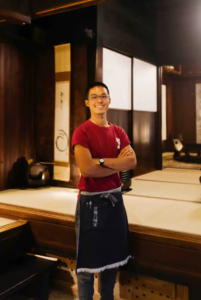From production assistant to café owner, Xian Jie shares his journey of restoring a historic kominka and embracing rural life.
Xian Jie, a Singaporean with a passion for culture and community, is on a remarkable journey to restore a 120-year-old teahouse in Japan. His adventure began after working as a documentary production assistant for Lianain Films in Singapore from 2011 to 2016, where he reported on environmental issues and democracy. In 2012, he moved to Japan to pursue a political science degree, partly to explore political stories in China but mostly to enjoy four years in the Land of the Rising Sun.
Today, Xian Jie operates a farm in Ryujin-mura, a quaint village in Japan, spanning about 10,000 square meters. He cultivates a variety of crops, including tea, yuzu, tomatoes, and lady’s fingers, depending on the season. Additionally, he runs a café every Friday and weekend within a traditional kominka, where he is actively involved in its restoration. Xian Jie has invested approximately S$25,000 of his savings, along with funds earned from his previous job as a tour guide, into refurbishing the historic building. Despite its rickety state, he takes immense pride in the progress made thus far.
Curating Alternative Tours in Japan
After completing his studies, Xian Jie co-founded a tour company called Craft Tabby in 2017, specializing in walking and cycling tours that reveal a different side of Kyoto. One notable tour, the “Alternative Fushimi Inari Walking Tour,” focused not only on the iconic vermilion torii gates but also on the local waterfalls, Shintoism, and the spiritual connection between the natural landscape and the people. At one point, this tour became the highest-rated experience on Airbnb and TripAdvisor.
However, the onset of the pandemic forced a halt to physical tours, prompting Xian Jie to pivot to “Online Experiences.” He creatively launched a virtual tour called “Flower Hunting In Kyoto With Mori The Doggo,” featuring a wild dog named Mori exploring gardens in search of edible flowers.
Restoring a 120-Year-Old Teahouse
Xian Jie’s deep connection to tea began at a tea festival years ago when he met a generous 70-year-old man named Shu, who offered him a taste of his tea. Enchanted by the flavors and the charm of Ryujin-mura, he decided to settle there amidst the pandemic. With Shu’s help, he secured a rental for a dilapidated house, embracing the challenge of restoring the 100-year-old structure instead of opting for a modern home.
The allure of a kominka lies in its open architecture, with features like pine tree floorboards and cherry blossom pillars, and Xian Jie aims to preserve its historical integrity. He documents his restoration journey on his YouTube channel, sharing insights into Japanese culture and the importance of maintaining a clean, well-kept home as a reflection of trustworthiness in the community.
Living in Rural Japan
Xian Jie values the spaciousness of rural Japan, especially in Ryujin-mura, which has a population of just 2,900. Contrary to the crowded image often associated with Japan, he finds solace in the vast areas surrounding each home, making isolation unnecessary during the pandemic.
Building relationships with neighbors has been essential. By investing time in repairs and renovations, he gained their trust, allowing them to share positive word-of-mouth about his tea endeavors. Engaging in community activities, such as the New Year shrine gathering and annual grass-cutting events, has strengthened his ties to the village.
From Production Assistant to Managing a Teahouse
Xian Jie reflects on how his life has transformed since his days as a production assistant. While production work involved strict deadlines, the pressures of running a café provide a different kind of satisfaction. Preparing for Happy Hour every Friday demands effort, from landscaping to ensuring impeccable service standards, but the surrounding nature and fresh produce make it a rewarding experience.
He appreciates the peacefulness of rural life, contrasting it sharply with the stress of city living in Singapore. The community spirit in Ryujin-mura fosters a sense of belonging, where neighbors look out for one another. Whether it’s sharing resources during natural disasters or simply enjoying a conversation outdoors, Xian Jie finds joy in the camaraderie that defines village life.
As he continues his journey, Xian Jie has no intention of returning to Singapore permanently. While he values his friendships and family, he relishes the tranquility and fulfillment that rural Japan offers, embracing a life filled with purpose, community, and, of course, tea.








